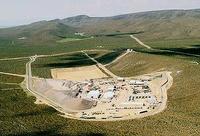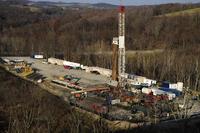-
Verizon says it is ready for hurricane season
With less than a month to go until the start of the 2012 hurricane season, Verizon says its wireless network is prepared to serve customers in the event of a major storm or emergency
-
-
Business continuity paper competition winner announced
A paper titled “High Fidelity Simulation Exercises for Training Strategic Crisis Management” wins continuity journals’ best Business Continuity Paper of the Year 2012 competition
-
-
Yucca Mountain as a data depository

For nearly three decades, Yucca Mountain was the place designated as the country’s nuclear waste repository; after many years of study and exploration, the Obama administration, two years ago, decided not to ask for additional funds for the project; now there is another idea for the site: turning it into a giant, secure data center
-
-
Improve tsunami warnings by placing GPS on commercial ships
Researchers find that commercial ships travel across most of the globe and could provide better warnings for potentially deadly tsunamis; this finding came as a surprise because tsunamis have such small amplitudes in the deep water, in contrast to their size when they reach the coastline, that it seemed unlikely that the tsunami would be detected using GPS unless the ship was very close to the source and the tsunami was very big
-
-
U.S. severe weather insurance losses in April nearly $1 billion
A series of severe weather events across central and southern sections of the United States caused upward of $1 billion in insured losses. Economic losses were even higher during the month of April
-
-
Hospital-based disaster preparedness center opens in Utah
A 7,000 square-foot disaster preparedness center opened in Salt Lake City; the center is a fully-equipped environment with eighteen patient rooms, medical training mannequins, training classrooms, disaster simulation labs, and a secure supply area; the key is that the preparedness training is done in a working environment
-
-
Steps organizations should take to prepare for disasters
Even if your company has not been affected by tornados, tsunami waves, or wildfires, all employers need to be prepared for the mayhem that natural disasters cause
-
-
British state-backed reinsurer has £4.5 billion to cover Olympic Games terror-related losses
Pool Re, the British state-backed reinsurer which covers commercial property losses from terror attack-related activities, has £4.5 billion ($7.327 billion) of assets to cover the Summer Olympic Games. Pool Re said it had no plans to jack up premiums for the event. If the damage from bombings or other terror-related incidents were to cost more than that amount, the British taxpayer, under the Pool Re structure, would step in to cover the difference. Pool Re was set up in the 1990s when the U.K. government was worried that the terror campaign pursued by Irish militant groups could make London property uninsurable and damage the national economy.
-
-
New micro helicopters for search and rescue missions
New micro helicopters have a diameter of about fifty centimeters, weigh only 1,500 grams; they do not rquire GPS or remote control to navigate; they are designed to maneuver in tight or even enclosed spaces, and to detect and fly around any obstacle; possible uses could include protection or rescue missions, and they are ideal for flying over disaster areas and giving a picture of the situation from the air or locating victims
-
-
NASA to test new system of rapid earthquake analysis
The National Aeronautics and Space Administration (NASA) is prepared to begin testing this year a new system rapidly and accurately to measure the location and intensity of large earthquakes; the new system combines the traditional network of seismic monitors already in place with GPS technology
-
-
Safe fracking requires distance from sensitive rock strata
Fracking — the process which releases natural gas and oil from shale rock strata – is becoming more and more popular because it promises access to new, abundant sources of energy; the process of fracking, however, has been associated with increase in the frequency of earthquakes and contamination of drinking water; scientists examine thousands of fracking operations in the United States, Europe, and Africa, and conclude that in order to minimize water contamination and earthquakes, there should be a minimum distance of at least 0.6 km between a fracking operation and sensitive rock strata
-
-
Designing stormwater systems for the future
Researchers study how climate change is affecting rainfall and weather patterns throughout Kansas to help with future adaptation and mitigation strategies; the researchers are updating rainfall distribution data to ensure current stormwater management systems can handle future weather changes
-
-
Increased U.S earthquakes may be caused by fracking

From 1970 to 2000 the number of magnitude 3.0 or greater temblors in the U.S. mid-continent averaged twenty-one annually; by 2011 the number of such quakes had increased to 134; a new study by the U.S. Geological Survey links the increase of seismic activity to the increase in the use of hydraulic fracturing, or fracking
-
-
Cost of a dirty bomb attack in L.A. would reach $16 billion

A dirty bomb attack on downtown Los Angeles’ financial district could severely affect the region’s economy at a cost nearly $16 billion, fueled primarily by psychological effects which could persist for a decade
-
-
Scientists: Deepwater Horizon exposed gaps in deepwater oil spill knowledge

On the second anniversary of the Deepwater Horizon oil spill in the Gulf of Mexico, a national team of scientists warns that inadequate knowledge about the effects of deepwater oil well blowouts threatens scientists’ ability to help manage comparable future events
-
More headlines
The long view
The Surprising Reasons Floods and Other Disasters Are Deadlier at Night
It’s not just that it’s dark and people are asleep. Urban sprawl, confirmation bias, and other factors can play a role.
Why Flash Flood Warnings Will Continue to Go Unheeded
Experts say local education and community support are key to conveying risk.
